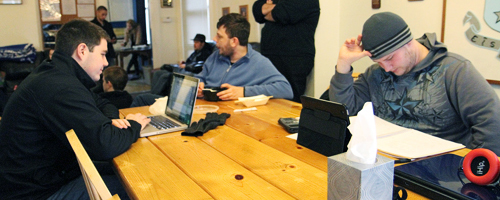
If you thought you had Greek life all figured out, think again.
Portland State students participating in sororities and fraternities say they aren’t wasting any time partying.
Instead, they say they are dedicating time to philanthropy, education and friendship.
“We have a new advisor, Jason Clark, who is helping to change the direction of PSU’s Greek life,” said Greek Council President Hayden Leach, a member of Phi Delta Theta fraternity.
Rather than trying to force PSU’s Greek life to conform to that of other universities, Clark is taking PSU in a new direction, Leach said.
Because PSU is a commuter campus with older-than-average undergraduate students, it is only fitting that PSU’s Greek life have its own set of goals, he said.
With five recognized Greek houses on campus—two sororities and three fraternities—and only 150 members, the number of students involved in Greek life is less than 1 percent, an unusually low number.
However, beyond a change in direction, there has also been a recent growth in membership, Leach said.
“We used to look for people to fill rooms at the house; now we have a waitlist.”
While the number of members has been increasing, growth is still a priority at council meetings, as well as the unification of the existing five houses.
“My goal, and the platform that I ran on for president, is unification: to bring us all closer and work together,” Leach said.
At PSU, there are many misconceptions regarding Greek life, its participants said.
The first is that all fraternity and sorority members are heavy drinkers.
“People tend to associate Greek life with drinking and partying, but so far that is not the case in any way. We are very focused on philanthropy and education,” Leach said of the PSU Greek houses.
Also linked to Greek life is the act of hazing, which has become a national issue, with horror stories circulating of hazing gone wrong.
“We and all the houses on campus are very anti-hazing,” said Scott Uhls, a member of Phi Delta Theta since spring 2011. The first week of the year is dedicated to discussing the consequences of hazing as well as finding other, more beneficial ways of creating a brotherhood bond, Uhls said.
“Every student even has to sign a contract saying they will not haze another student,” Uhls said.
Another misconception surrounding Greek life, and fraternities especially, is that a member of the same house will “back up” another member no matter what the situation, members said.
“We are not an ‘old boy’s club.’ If you do something against the guidelines, we won’t back you up. We’ll be standing right beside the administration. You have to earn a spot. We hold high morals and ethics [standards],” Uhls said.
Members said there are many benefits to joining.
“I was apprehensive at first and didn’t see the draw,” said PSU junior Donovan Powell, a member of Phi Delta Theta. However, after discovering that making friends on a commuter campus was more difficult than he thought, Powell said it was a “great group of guys who really got me wanting to join.”
Uhls is Powell’s “big brother,” or house mentor.
“We are the closest friends. We share a room. It can be the best of times, and it can be the worst of times, but at least we are having those times!” Powell said.
Uhls explained that he, too, was skeptical of joining a fraternity at first, saying that he did plenty of research, looking at the pros and cons of each fraternity option on campus.
Of all the good memories gained through Greek life, Uhls’ favorite experiences involved becoming a big brother to two new members.
“I get to help them get closer to an organization that I love and am a part of, and I get to share that love and passion,” Uhls said.
“Not only do you have a group of automatic friends, but you have brothers,” Leach said.
In addition to making bonds, giving back to the community is hugely important to all Greek houses, members said.
Nearly all the events thrown by the Greek council simultaneously serve as food drives, Leach said.
“The sororities also focus heavily on raising awareness [of] domestic violence,” Leach added, listing some of the many different causes the fraternities and sororities aid.
Also beneficial to members of Greek life is the focus on education, participants said. There is a support group for studying, Leach explained, noting that many of the members help one another with classes and homework.
Beyond the immediate network of friends on campus, there is also a national network of brothers and sisters that one becomes a part of when joining Greek life.
“Within my chapter, I can call any member across the nation and know that I will have a place to stay as well as [a] tour guide,” Leach said.
To any students on the fence about joining, Leach has a message: “Keep an open mind. Explore your options. Meet the people. Do research, and give it a shot.”
